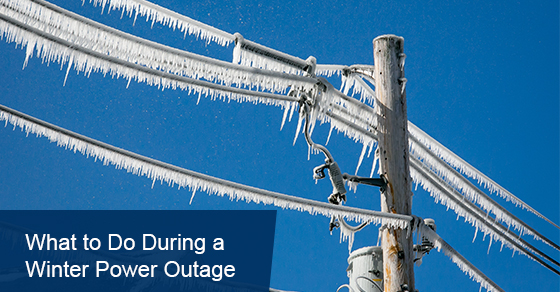
What to Do During a Winter Power Outage
Experiencing a power outage during the summer can be a nuisance and might interrupt some of your precious TV time. But it is very different from experiencing an outage during winter. In contrast, a power outage during a Canadian winter can be dangerous if you are not prepared for them.
Various problems can arise during a winter blackout, from freezing pipes or hypothermia. Also, there is no telling how long it will take for your power to come back on, which adds to the dangers of a winter power outage.
With many people working from home thanks to the pandemic, a winter power outage could cause even more negative effects during this winter. It’s a great idea to learn what you can do to minimize a power outage’s effects. Take some time to figure out what you can do before, during and after a power outage to keep you and your family safe and warm until the power returns.
Preparations You Can Make in Advance for a Winter Power Outage
Not making any adequate preparations in advance before an anticipated power outage is one of the biggest threats to keeping dry, warm and fed during this time. Besides winterizing your home before the temperatures drop, there are a few more things you should do to make sure your home is always prepped for a blackout.
You probably won’t have time to do much on the day of the storm, so it’s a good idea to plan.
- Make sure your pantry is well-stocked with at least three days worth of non-perishable goods and bottled water (for every individual in your household, as well as your pets). Keep extra water for cooking and cleaning.
- Build an emergency kit and keep it somewhere you can find it in the dark. It should include: matches and candles, flashlight and batteries, wind-up or battery-powered radio, first aid kit, manual can opener and blankets.
- For lighting, opt for flashlights instead of candles to avoid a fire hazard.
- Charge all of your electrical devices before the storm.
- Fill your gas tank in your car
- If you live in a rural community, you might want to consider investing in a gas generator as power might take a while to be restored in harder to reach areas.
What to Do During the Power Outage
1. Stay calm and collected
The first thing to keep in mind is to stay calm, even though it might be tempting to find out what is going on or when your power will be restored. Calling 9-1-1 should be reserved for emergencies only. Avoid calling in unless someone is in trouble or there are downed power lines near your home.
2. Turn off all your lights and pull your plugs
Unplug as many appliances and electronics as possible if there is a power surge when the power is restored. Certain electronics, such as computers or media players, can become damaged by power surges once the power is restored. You can leave one light on to notify you when the power comes back.
3. Stay warm by layering up and sticking together
The biggest challenge during a winter power outage for homes reliant on electric heating is keeping them warm. Hypothermia can be deadly and set in unexpectedly. Ensure that your home is adequately stocked with blankets and that your doors and windows are sealed.
Wear clothes in layers, and be sure to keep your head and feet covered up to keep your body’s natural heat in. Dressing in layers is incredibly important. It is better than wearing only one hot layer because you might sweat and get too hot. But once you remove it, you might cool down too fast, which might trigger hypothermia. Layers allow you to remove them one at a time and keep you at a more stable temperature.
If you’re still feeling cold, grab a warm blanket and snuggle up on the couch with your loved ones and pets and get warmed up together.
4. Listen to the news
Use your smartphone or battery-powered radio to stay tuned for the latest updates. If you don’t have any access to this equipment, use your landline to call relatives or friends. You can let them know you are OK, share the tips found in this article and stay on top of news updates.
5. Keep the cool air where it belongs — in your fridge
Did you know that a full freezer can keep food frozen for up to 36 hours when the door is kept shut? Besides the benefit of keeping your food cold for longer, you’ll also keep the cool air from leaking into your house when you keep your fridge and freezer doors closed. You might be tempted to stash food outside in the snow, but it could spoil when the sun comes out or attract hungry animals.
6. Don’t go for gas while stuck inside
Using a gas generator, outdoor camping heater, or charcoal barbecue inside your home or garage can cause carbon monoxide poisoning. Carefully read instructions for the generator or alternative heat source before turning it on.
7. Avoid freezing pipes
One single frozen pipe could result in expensive flooding in your home. If your home is heated using electricity, you can keep all of your taps on a slow drip to prevent them from freezing water in your home’s pipes. This small action can save you thousands of dollars down the line.
For more information about protecting your home with insurance services in Oshawa, call W.B. White at 1-877-727-0757 or contact us here.
Leave A Comment
The comments are closed.


